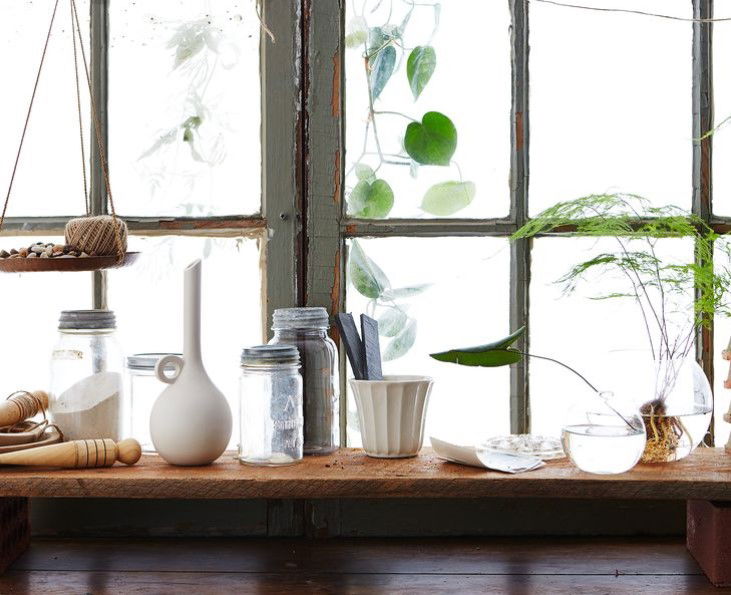The Essential Tools for a Thriving Indoor Garden


so you need to begin a greenhouse—a windowsill garden! You've begun to consider what you're going to plant (herbs aplenty!), and found the sunniest windowsill available to you. Be that as it may, you're going to require somewhat more than a bright windowsill: Luckily, the great people over at The Sill, a N.Y.C.- based organization gaining practical experience in indoor plant care, are here to share what they think about the fundamental apparatuses for cultivating inside. This is what you'll have to get your windowsill nursery off the ground, in a manner of speaking, from The Sill's Plant Specialist, Christopher Satch:
You Really Don't Need That Much. Be that as it may, You Will Need...
Plant Containers
The sort of compartment—depleting or non-depleting—you use relies upon what you'll plant in it. Plants that need dry roots (like most herbs) ought to have a self-depleting holder with gaps in the base and a dish underneath to get any abundance water; plants that lean toward wet roots (like greeneries) will be glad in non-depleting compartments. Simply expel the plant from the plastic pot it came in before setting it up in the holder!
Soil
"General gardening soil or preparing blend is immaculate" for any houseplants or herbs, says Christopher. You can frequently discover natural adaptations, as well.
Compost
Natural or something else, a little compost can help give indoor greenhouses a lift. The Sill utilizes a delicate natural compost called FoxFarm, however any universally handy general manure in a weakened quality will be okay. (The manure's bundling will educate you how to weaken it and how much and how regularly to utilize.)
A Watering Can
Search for one with a gush that has a shower head-type connection. This is significant for fragile plants like herbs! An immediate gush—one in number, single stream—could accomplish more damage than anything else, while a gush that occupies the water is progressively delicate, and shields the water from flooding a few pieces of the bed and missing different parts totally.
A couple of sharp scissors will enable you to trim the plant of any saggy sprigs (or sprigs you need to cook with).
Light
"Herbs truly need a great deal of light—or a supplemental light," says Christopher. Ensure you have a windowsill that gets immediate light for in any event 8 hours of the day; on the off chance that you don't, consider setting up a light to enable the little plants to get the light they need.
You can utilize a develop light from the equipment or cultivating store, yet any light is fine as long as they have a decent light in them—"great" which means useful for the plant, which means the same number of lumens (that is the all out amount of obvious light radiated) as could be allowed. Most minimized bright light bulbs and warm-tinted LED bulbs function admirably, says Christopher; those are what he utilizes without anyone else plants. Be that as it may, various plants react to various bulbs, so you may need to examination to discover what works best for your nursery.
The Most Important "Instruments" Are The Plants Themselves.
That is, in case you will put resources into one piece of your nursery, it ought to be your plants.
You should consider it a similar way you'd consider purchasing some other significant wear-or-use-it-consistently thing, similar to a couple of shoes or a sleeping cushion, Christopher clarifies: If you purchase a modest plant, there's a decent possibility it won't keep going excessively long. Be eager to spend somewhat more on something that looks great and solid and sound, and purchase from a spot that truly appears to realize what they're doing and is putting every one of their assets in the plants—that is, a claim to fame plant or nursery store (not a home improvement or market).
More Tips For Choosing And Buying Plants:
"You ought to know what the plant ought to resemble," says Christopher—Google pictures of it! Realize which plants are somewhat yellowish ordinarily—or excessively green, or somewhat blue. "Dill, for instance, ought to be kind of blue when it's extremely sound, yet gets greener when it's not doing as such well." Knowing what the plant resembles when it's solid will enable you to pick a cheerful plant.
Check to ensure the roots aren't leaving the base of the holder, which shows that the plant is congested and has been in its compartment excessively long. It ought to likewise have a solid, well-created stalk or stem, and shouldn't tumble over from its very own weight.
A standout amongst Your Most Valuable "Apparatuses" Is Other Gardeners.
"Plant specialists are the absolute friendliest individuals I've at any point met," Christopher says. Find different plant specialists and ask them inquiries! In case you don't know where to begin looking, head to a nearby greenhouse focus, or search out an ace plant specialist (each state has one!). They're knowledgable about everything from houseplants and herbs to bigger outside plants.



